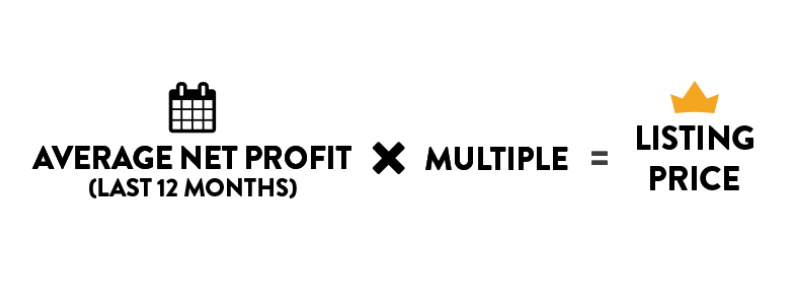How to Value a Marketing Agency (And Actually Sell It)
Knowing the dollar value of your marketing agency puts you in a strong position. When it comes time to sell your agency, you’ll be able to command the value it’s worth and be rightfully rewarded for all of the hard work you’ve put into building it.
Agencies usually sell on our marketplace anywhere between 20-40X the monthly net profit of the agency depending on a number of value factors we’ll discuss in this article. Having said that, when a recognized company like SEOButler comes along we were able to win the seller a 44X their net profit. When we sold SEOButler, the seller walked away with close to one million dollars.
SEOButler earned a 44X multiple because it wasn’t just a well-built agency, it was an established brand with a strong reputation in its niche. While fundamental metrics like profitability, operability, and scalability are the most important valuation factors, brand defensibility will put your agency in the upper range of the valuation bracket.
What Marketing Agency Buyers Look For
Agency buyers look at your agency as an investment asset when assessing its value. They spend most of their time looking at its tangible qualities.
They really want the asset to do one thing: consistently generate profits over a long period of time.
To determine whether your agency will do that one thing, they’ll assess every aspect of it. We know what buyers look at and how they tie value to each aspect of your agency; we use this knowledge to guide how we value marketing agencies.
Let’s explore these areas to understand how we arrive at your company’s value.
How Marketing Agencies Are Valued: The 8 Valuation Factors
1. Agency Revenue And Earnings
Profit is the lifeblood of your agency, so it’s the first thing we look at.
We’d first want to understand the profitability of your company, i.e. how much revenue is it generating compared to how much is being spent on company expenses.
To assess this, we go through your profit and loss statement (P&L) to see all of the income and expense sources.
The higher your company’s profit margin, the more it could be worth. I say “could” because there are some exceptions. For example, if you have really low expenses, but your agency operations are unmanageable because you’ve saved money on hiring employees or paying for tools that could help make your agency run efficiently, then your agency would have a low value multiple because there’s a lot of mess for the buyer to clean up when they acquire your agency.
It’s best to strike a balance between profitability and operability. Try and cut out unnecessary expenses without sacrificing operational efficiency.
2. Agency Clients
Every agency is unique in how its clients fuel the business.
Some are mostly supported by a high volume of short-term contracts on a pay-as-you-go basis. Some rely on a small number of high-ticket, long-term clients. Most sit somewhere in the middle.
The revenue divide of your company’s revenue model has an influence on your agency’s valuation multiple. For example, if 80% of your revenue comes from just two high-ticket clients and the rest from low-to-mid-ticket clients, then your agency will be considered a risky asset—if you lose one of those high-ticket clients, you’ve instantly lost 40% of revenue.
Another valuation factor is your marketing funnel. That is, how you’re sourcing and onboarding new clients and the associated costs with those processes.
If your main form of outreach is advertising, then we’ll look at the performance metrics for your campaigns, including customer acquisition cost and return on ad spend to assess the strength of your funnel.
Related to how you’re sourcing and onboarding clients is the seasonality of your agency and how consistently your agency is generating revenue from clients.
Other metrics related to your agency clients also come into play when valuing your agency, including client retention rate, churn rate, and customer lifetime value.
3. Agency Team
Next, we look at how you serve your clients with your team.
Your team structure is core to the operability of your agency. We consider the team roles, how long your employees have been working in the business, how they work together, your involvement as the owner, and whether the team will be continuing with the business after the sale.
You want to make sure your team operates as efficiently as possible with minimal input from yourself.
4. Agency Operations
The easier it is for a buyer to take over your company and continue running it as normal, the easier it will be to sell and the more valuable it will be. Productive agency management leads to high valuation multiples.
You should have your whole company operations well documented with standard operating procedures (SOPs).
Buyers will also appreciate the support from you as the owner after the sale for at least a couple of months to train them in the role.
5. Defensibility
Now we’re looking at your agency from the outside to assess its value.
We want to know how long your agency will last. If it is already aged by 3 years or more, then it is in good stead. The reputation of your agency in the niche shown by customer and employee reviews will also have an impact on its valuation.
Another aspect of defensibility is the unique selling proposition for your agency. Trademarks and copyrights are valuable defense assets to have.
6. Business Niche
Looking at the niche your agency is in, there are a number of aspects of the niche we’d like to know about:
- How accessible is your niche to new competition?
- How big is your niche? Is there room for growth?
- Is your niche growing or shrinking?
- Are there any new developments that are putting your niche at risk?
A buyer will ask these questions about your niche. Most value agencies in evergreen niches highly as they don’t have to worry as much about external influences impacting their asset as they would for newer, riskier niches.
7. Single Points of Failure In Your Agency
Every agency has risks, what you don’t want is single points of failure.
These are aspects of your agency that if removed or impaired can greatly impact your agency.
For marketing agencies, the biggest threat to your business is key person risk. If the effectiveness of your agency operations is heavily reliant on one A* employee, then losing that employee would slow operations right down or even halt them altogether.
The same goes for clients.
If your revenue mostly comes from one client and you lose that client, you lose most of your revenue.
These are reasons why it’s important to firm up your agency to mitigate these risks as much as possible; have a full client pipeline and efficient onboarding process, manage any loans effectively, and put assets in place to increase employee retention.
8. Business Assets
Does your agency have an office? If so, you will need to find a buyer who is comfortable running an agency with an office.
If you’re able to adapt your agency operations to where the owner doesn’t need to be present in a physical location, then you open your buyer pool wider and increase your potential to sell your agency for a higher value.
Other assets associated with your agency could be:
- Physical equipment
- Team of employees including employee contracts
- Website
- Client contact list
- Email marketing list
- Social media accounts
- Agency accounts
How these assets support your agency and whether or not they’re included in the sale will affect your agency valuation.
Calculating The Value Of Your Agency
Before looking into any of the areas of your agency above, a buyer or professional valuer will evaluate the profitability of your agency.
Agencies are valued based on their profits, not their revenue; for the obvious reason that two agencies could be earning the same amount of revenue but bringing home widely different amounts of profit.
The most common methods for calculating agency profit are seller discretionary earnings (SDE) and earnings before interest, tax, depreciation, and amortization (EBITDA).
SDE
To calculate the SDE for your agency, you take your revenue for the year or month and subtract all of the agency expenses you paid that month or year.
Some examples of common agency expenses for agencies include
- Employee wages
- Equipment
- Office rent
- Website hosting fees
- Marketing costs
If you take a salary from your marketing agency, that would also be classified as an expense.
What you’re left with is the capital you take home that isn’t owed to anybody else.
EBITDA
The EBITDA calculation method is a bit more complex than SDE and large companies mostly use it.
The foundational income minus expenses calculation is the same, except the EBITDA method also accounts for subtle factors that take from your income including interest, depreciation, and amortization.
Agencies with values up to the six-figure range are usually ok to use the SDE method to calculate profits. Companies above that tend to use the EBITDA method.
Once your profits are cleared up, you can start looking at using a valuation formula to calculate the potential sale value of your marketing agency.
The Agency Valuation Formula That Tells You How Much You Can Exit For
The valuation formula we use to calculate the value of a marketing agency is as follows:
We take your average net profit over the past 12 months to account for any seasonality or spikes or dips in performance your agency experiences over the year.
The multiple of your marketing agency is calculated from the eight valuation factors above. We consider all areas of your agency to assign this figure.
What is the Valuation Multiple For Marketing Agencies?
Agencies usually sell on our marketplace with a multiple between 20-40X. That means if your agency has earned $3,000 over the past 12 months, it could be worth between $60,000 and $120,000.
The biggest influencers on the valuation of your business are:
- Age
- Profitability
- Earnings history (consistency and growth or decline)
- Team structure
- Niche
- Defensibility against competitors and the market
If you’d like to get the highest value possible for your agency, make sure your financials and operations are clean and organized. This will not only allow you to see the areas in your business that can be improved, it will help you increase the profitability and efficiency of your agency so you work less and take more money home.
Then, when you’re ready to sell, you have a highly-attractive asset that buyers will fight for.
Get A Professional Valuation From A Broker For A Max Profit Sale
When you want to know the value of your agency, you can utilize the data and experience that a broker has accumulated over time (we’ve sold 1,900+ businesses in our 12 years as a broker) to get an accurate valuation.
Brokers know their buyer pool and what types of assets they like to buy, so they’ll be able to tell you with certainty what buyers will be willing to pay for your business (our buyer pool currently has over $7BN in verified funds on our marketplace ready to be deployed into online businesses).
However, all other brokers stop there and leave the marketing of your business, negotiations with buyers, and collecting your funds from the sale all up to you. At Empire Flippers we have a team of 80+ employees spread across seven teams to steward you through all stages of the sale of your business.
If you’d like to utilize our huge buyer pool and concierge service to sell your marketing agency, then submit it for review by our vetting team—it takes just a few minutes.
Or if you’d like to quickly see what your agency could be worth, complete our free valuation tool built on algorithms that use the data from the sales of over 1,900 businesses.





